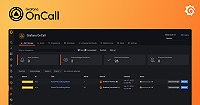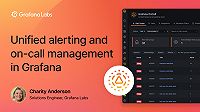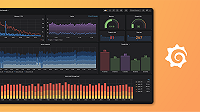Important: This documentation is about an older version. It's relevant only to the release noted, many of the features and functions have been updated or replaced. Please view the current version.
Create a schedule
curl "{{API_URL}}/api/v1/schedules/" \
--request POST \
--header "Authorization: meowmeowmeow" \
--header "Content-Type: application/json" \
--data '{
"name": "Demo schedule iCal",
"ical_url_primary": "https://example.com/meow_calendar.ics",
"slack": {
"channel_id": "MEOW_SLACK_ID",
"user_group_id": "MEOW_SLACK_ID"
}
}'The above command returns JSON structured in the following way:
{
"id": "SBM7DV7BKFUYU",
"name": "Demo schedule iCal",
"type": "ical",
"team_id": null,
"ical_url_primary": "https://example.com/meow_calendar.ics",
"ical_url_overrides": "https://example.com/meow_calendar_overrides.ics",
"on_call_now": ["U4DNY931HHJS5"],
"slack": {
"channel_id": "MEOW_SLACK_ID",
"user_group_id": "MEOW_SLACK_ID"
}
}| Parameter | Unique | Required | Description |
|---|---|---|---|
name | Yes | Yes | Schedule name. |
type | No | Yes | Schedule type. May be ical (used for iCalendar integration) or calendar (used for manually created on-call shifts). |
team_id | No | No | ID of the team. |
time_zone | No | Optional | Schedule time zone. Is used for manually added on-call shifts in Schedules with type calendar. Default time zone is UTC. For more information about time zones, see time zones. |
ical_url_primary | No | If type = ical | URL of external iCal calendar for schedule with type ical. |
ical_url_overrides | No | Optional | URL of external iCal calendar for schedule with any type. Events from this calendar override events from primary calendar or from on-call shifts. |
slack | No | Optional | Dictionary with Slack-specific settings for a schedule. Includes channel_id and user_group_id fields, that take a channel ID and a user group ID from Slack. |
shifts | No | Optional | List of shifts. Used for manually added on-call shifts in Schedules with type calendar. |
HTTP request
POST {{API_URL}}/api/v1/schedules/
Get a schedule
curl "{{API_URL}}/api/v1/schedules/SBM7DV7BKFUYU/" \
--request GET \
--header "Authorization: meowmeowmeow" \
--header "Content-Type: application/json" \The above command returns JSON structured in the following way:
{
"id": "SBM7DV7BKFUYU",
"name": "Demo schedule iCal",
"type": "ical",
"team_id": null,
"ical_url_primary": "https://example.com/meow_calendar.ics",
"ical_url_overrides": "https://example.com/meow_calendar_overrides.ics",
"on_call_now": ["U4DNY931HHJS5"],
"slack": {
"channel_id": "MEOW_SLACK_ID",
"user_group_id": "MEOW_SLACK_ID"
}
}HTTP request
GET {{API_URL}}/api/v1/schedules/<SCHEDULE_ID>/
List schedules
curl "{{API_URL}}/api/v1/schedules/" \
--request GET \
--header "Authorization: meowmeowmeow" \
--header "Content-Type: application/json"The above command returns JSON structured in the following way:
{
"count": 2,
"next": null,
"previous": null,
"results": [
{
"id": "SBM7DV7BKFUYU",
"name": "Demo schedule iCal",
"type": "ical",
"team_id": null,
"ical_url_primary": "https://example.com/meow_calendar.ics",
"ical_url_overrides": "https://example.com/meow_calendar_overrides.ics",
"on_call_now": ["U4DNY931HHJS5"],
"slack": {
"channel_id": "MEOW_SLACK_ID",
"user_group_id": "MEOW_SLACK_ID"
}
},
{
"id": "S3Z477AHDXTMF",
"name": "Demo schedule Calendar",
"type": "calendar",
"team_id": null,
"time_zone": "America/New_York",
"on_call_now": ["U4DNY931HHJS5"],
"shifts": ["OH3V5FYQEYJ6M", "O9WTH7CKM3KZW"],
"ical_url_overrides": null,
"slack": {
"channel_id": "MEOW_SLACK_ID",
"user_group_id": "MEOW_SLACK_ID"
}
}
]
}The following available filter parameter should be provided as a GET argument:
name(Exact match)
HTTP request
GET {{API_URL}}/api/v1/schedules/
Update a schedule
curl "{{API_URL}}/api/v1/schedules/SBM7DV7BKFUYU/" \
--request PUT \
--header "Authorization: meowmeowmeow" \
--header "Content-Type: application/json" \
--data '{
"name": "Demo schedule iCal",
"ical_url": "https://example.com/meow_calendar.ics",
"slack": {
"channel_id": "MEOW_SLACK_ID"
}
}'The above command returns JSON structured in the following way:
{
"id": "SBM7DV7BKFUYU",
"name": "Demo schedule iCal",
"type": "ical",
"team_id": null,
"ical_url_primary": "https://example.com/meow_calendar.ics",
"ical_url_overrides": "https://example.com/meow_calendar_overrides.ics",
"on_call_now": ["U4DNY931HHJS5"],
"slack": {
"channel_id": "MEOW_SLACK_ID",
"user_group_id": "MEOW_SLACK_ID"
}
}HTTP request
PUT {{API_URL}}/api/v1/schedules/<SCHEDULE_ID>/
Delete a schedule
curl "{{API_URL}}/api/v1/schedules/SBM7DV7BKFUYU/" \
--request DELETE \
--header "Authorization: meowmeowmeow" \
--header "Content-Type: application/json"HTTP request
DELETE {{API_URL}}/api/v1/schedules/<SCHEDULE_ID>/
Export a schedule’s final shifts
HTTP request
curl "{{API_URL}}/api/v1/schedules/SBM7DV7BKFUYU/final_shifts?start_date=2023-01-01&end_date=2023-02-01" \
--request GET \
--header "Authorization: meowmeowmeow"The above command returns JSON structured in the following way:
{
"count": 12,
"next": null,
"previous": null,
"results": [
{
"user_pk": "UC2CHRT5SD34X",
"user_email": "alice@example.com",
"user_username": "alice",
"shift_start": "2023-01-02T09:00:00Z",
"shift_end": "2023-01-02T17:00:00Z"
},
{
"user_pk": "U7S8H84ARFTGN",
"user_email": "bob@example.com",
"user_username": "bob",
"shift_start": "2023-01-04T09:00:00Z",
"shift_end": "2023-01-04T17:00:00Z"
},
{
"user_pk": "UC2CHRT5SD34X",
"user_email": "alice@example.com",
"user_username": "alice",
"shift_start": "2023-01-06T09:00:00Z",
"shift_end": "2023-01-06T17:00:00Z"
},
{
"user_pk": "U7S8H84ARFTGN",
"user_email": "bob@example.com",
"user_username": "bob",
"shift_start": "2023-01-09T09:00:00Z",
"shift_end": "2023-01-09T17:00:00Z"
},
{
"user_pk": "UC2CHRT5SD34X",
"user_email": "alice@example.com",
"user_username": "alice",
"shift_start": "2023-01-11T09:00:00Z",
"shift_end": "2023-01-11T17:00:00Z"
},
{
"user_pk": "U7S8H84ARFTGN",
"user_email": "bob@example.com",
"user_username": "bob",
"shift_start": "2023-01-13T09:00:00Z",
"shift_end": "2023-01-13T17:00:00Z"
},
{
"user_pk": "UC2CHRT5SD34X",
"user_email": "alice@example.com",
"user_username": "alice",
"shift_start": "2023-01-16T09:00:00Z",
"shift_end": "2023-01-16T17:00:00Z"
},
{
"user_pk": "U7S8H84ARFTGN",
"user_email": "bob@example.com",
"user_username": "bob",
"shift_start": "2023-01-18T09:00:00Z",
"shift_end": "2023-01-18T17:00:00Z"
},
{
"user_pk": "UC2CHRT5SD34X",
"user_email": "alice@example.com",
"user_username": "alice",
"shift_start": "2023-01-20T09:00:00Z",
"shift_end": "2023-01-20T17:00:00Z"
},
{
"user_pk": "U7S8H84ARFTGN",
"user_email": "bob@example.com",
"user_username": "bob",
"shift_start": "2023-01-23T09:00:00Z",
"shift_end": "2023-01-23T17:00:00Z"
},
{
"user_pk": "UC2CHRT5SD34X",
"user_email": "alice@example.com",
"user_username": "alice",
"shift_start": "2023-01-25T09:00:00Z",
"shift_end": "2023-01-25T17:00:00Z"
},
{
"user_pk": "U7S8H84ARFTGN",
"user_email": "bob@example.com",
"user_username": "bob",
"shift_start": "2023-01-27T09:00:00Z",
"shift_end": "2023-01-27T17:00:00Z"
}
]
}Caveats
Some notes on the start_date and end_date query parameters:
- they are both required and should represent ISO 8601 formatted dates
end_datemust be greater than or equal tostart_dateend_datecannot be more than 365 days in the future fromstart_date
Lastly, this endpoint is currently only active for web schedules. It will return HTTP 400 for schedules defined via Terraform or iCal.
Example script to transform data to .csv for all of your schedules
The following Python script will generate a .csv file, oncall-report-2023-01-01-to-2023-01-31.csv. This file will
contain three columns, user_pk, user_email, and hours_on_call, which represents how many hours each user was
on call during the period starting January 1, 2023 to January 31, 2023 (inclusive).
import csv
import requests
from datetime import datetime
# CUSTOMIZE THE FOLLOWING VARIABLES
START_DATE = "2023-01-01"
END_DATE = "2023-01-31"
OUTPUT_FILE_NAME = f"oncall-report-{START_DATE}-to-{END_DATE}.csv"
MY_ONCALL_API_BASE_URL = "https://oncall-prod-us-central-0.grafana.net/oncall/api/v1/schedules"
MY_ONCALL_API_KEY = "meowmeowwoofwoof"
headers = {"Authorization": MY_ONCALL_API_KEY}
schedule_ids = [schedule["id"] for schedule in requests.get(MY_ONCALL_API_BASE_URL, headers=headers).json()["results"]]
user_on_call_hours = {}
for schedule_id in schedule_ids:
response = requests.get(
f"{MY_ONCALL_API_BASE_URL}/{schedule_id}/final_shifts?start_date={START_DATE}&end_date={END_DATE}",
headers=headers)
for final_shift in response.json()["results"]:
user_pk = final_shift["user_pk"]
end = datetime.fromisoformat(final_shift["shift_end"])
start = datetime.fromisoformat(final_shift["shift_start"])
shift_time_in_seconds = (end - start).total_seconds()
shift_time_in_hours = shift_time_in_seconds / (60 * 60)
if user_pk in user_on_call_hours:
user_on_call_hours[user_pk]["hours_on_call"] += shift_time_in_hours
else:
user_on_call_hours[user_pk] = {
"email": final_shift["user_email"],
"hours_on_call": shift_time_in_hours,
}
with open(OUTPUT_FILE_NAME, "w") as fp:
csv_writer = csv.DictWriter(fp, ["user_pk", "user_email", "hours_on_call"])
csv_writer.writeheader()
for user_pk, user_info in user_on_call_hours.items():
csv_writer.writerow({
"user_pk": user_pk, "user_email": user_info["email"], "hours_on_call": user_info["hours_on_call"]})Was this page helpful?
Related resources from Grafana Labs



